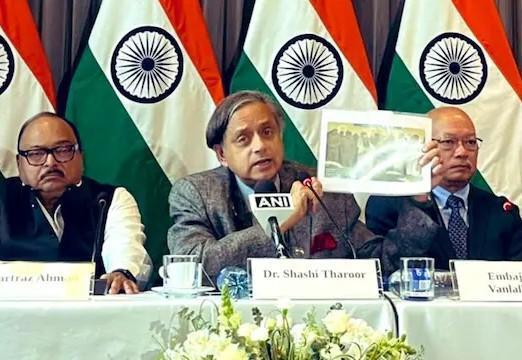
No Equivalence between Pak & India: Tharoor on Colombia’s Reaction on Op Sindoor
The recent condemnation by the Colombian delegation of the Operation Sindoor carried out by Indian forces against terrorist camps in Pakistan has sparked a heated debate in the political circles of India. Congress MP Shashi Tharoor, known for his sharp views on international affairs, has expressed disappointment over the decision, stating that there can be no equivalence between those who dispatch terrorists and those who resist.
In a recent statement, Tharoor emphasized that India has every right to exercise its right of self-defence against terrorism, and that the opposition to Operation Sindoor by the Colombian delegation is misplaced. He further added that the decision of the Colombian delegation to condole the loss of lives in Pakistan due to Operation Sindoor, rather than sympathizing with Indian victims of terrorism, is a clear indication of the lack of understanding of the situation by the South American nation.
Tharoor’s statement comes in the wake of the Colombian delegation’s visit to Pakistan, where they met with Prime Minister Imran Khan and other top officials. During their visit, they expressed their condolences over the loss of lives in Pakistan due to the Operation Sindoor, terming it as a “grave violation of human rights”. The delegation also called for a peaceful resolution of the Kashmir issue, which has been a long-standing point of contention between India and Pakistan.
However, Tharoor is not alone in his criticism of the Colombian delegation’s stance. Many experts and political leaders in India have come out in support of the government’s decision to carry out the Operation Sindoor, terming it as a necessary measure to counter the threat of terrorism emanating from Pakistan.
India has long been a victim of cross-border terrorism sponsored by Pakistan, with numerous attacks on its soil claiming thousands of lives. The country has repeatedly accused Pakistan of supporting terrorist groups, including the Lashkar-e-Taiba and the Jaish-e-Mohammed, which have been responsible for some of the most devastating attacks on Indian soil.
In recent years, India has taken a strong stance against terrorism, with the government announcing a series of measures to counter the threat. The Operation Sindoor, which was carried out in the Kashmir Valley, was seen as a significant blow to the terrorist networks operating in the region.
Despite the criticism from the Colombian delegation, India has maintained that the Operation Sindoor was a necessary measure to ensure the safety and security of its citizens. The government has also emphasized that the operation was carried out in accordance with the principles of international law, and that every effort was made to minimize civilian casualties.
Tharoor’s statement has also drawn attention to the double standards of the international community, particularly in the context of terrorism. He pointed out that while the world condones India’s right to self-defence against terrorism, it is quick to criticize the country for its actions.
“This is a classic case of double standards,” Tharoor said in an interview. “The international community is quick to condemn India’s actions, but it is silent when it comes to the actions of countries like Pakistan, which have been responsible for spreading terrorism across the world.”
Tharoor’s comments have sparked a heated debate in the political circles of India, with many calling for a stronger stance against terrorism and those who support it. The government has also come out in support of Tharoor’s statement, with Union Home Minister Amit Shah terming it as a “bold and courageous” stance.
In conclusion, the controversy surrounding the Colombian delegation’s reaction to the Operation Sindoor has highlighted the need for a stronger stance against terrorism and those who support it. India has every right to exercise its right of self-defence against terrorism, and the opposition to Operation Sindoor by the Colombian delegation is a clear indication of the lack of understanding of the situation by the South American nation.



